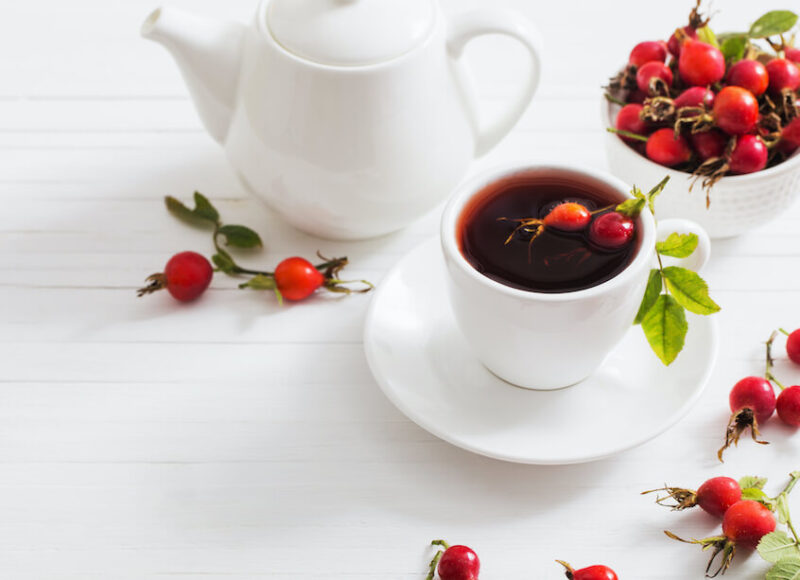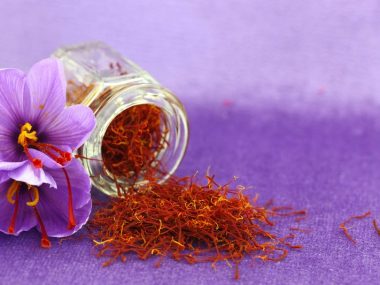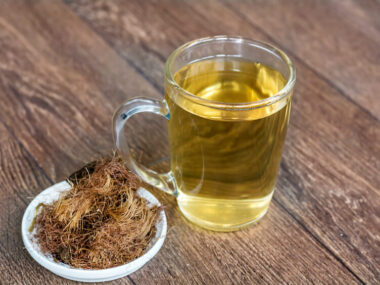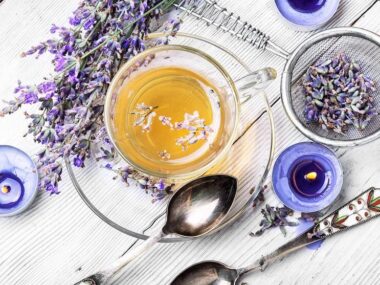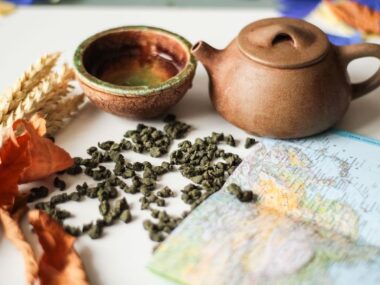What do curvaceous hips have to do with tea? Part of a beautiful rose goes unnoticed by many, yet it’s a very popular fruit gathered by herbalists and then used to brew aromatic rosehip tea!
Table of Contents
What Is Rosehip Tea?
Rosehip tea is a tisane (herbal tea) made from the fruit of rose plants belonging to the Rosa family (roses). Unlike what many may think, this tea does not taste like roses. This tea has been an integral part of traditional and folk medicine for hundreds of years to treat numerous medical conditions and ailments.
What Are Rose Hips?
Rose hips are bulbous formations on the underside of rose flowers. Rose plants belonging to the Rosa genus produce these formations. Although herbalists and traditional medicine users use rose hips from a number of different Rosa species, Rosa canina rose hips are the most commonly used to make tea.
The name may sound a bit odd, but there’s a reason for a term that infers “hips.” The life cycle of a rose paints a picture of where rose hips come from and sheds a bit of light on why it bears its name.
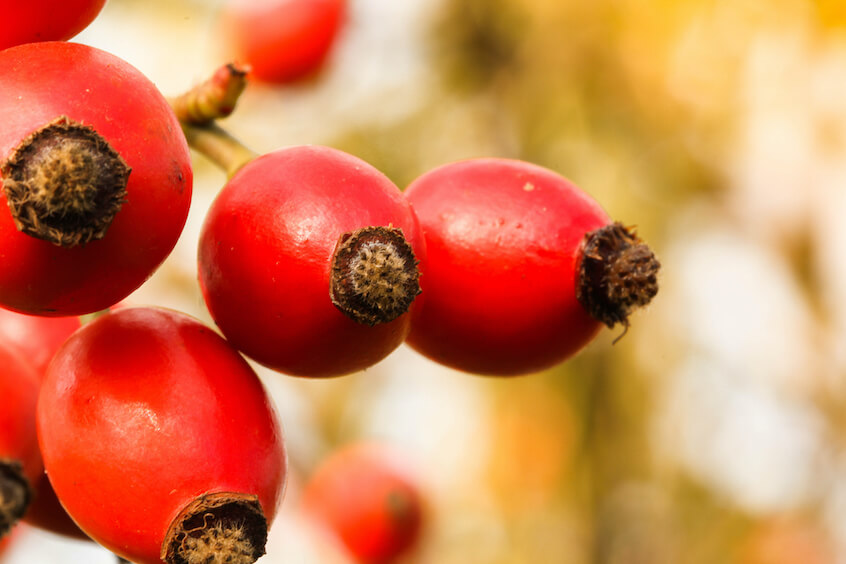
A beautiful rose has a bulbous form (about the size of your thumb) at the base of it where the rose petals give way to the green plant tissue and leaves. It’s this bulb-like formation that is a rosehip. Rose hips are green, while the rose flower is attached. Once the spent rose falls off, the rosehip ripens into a yellowish-orange, red, or purple color. This formation acts as a support for the rose flower (hence the word “hip.”) Within the rosehip are seeds that eventually fall to the ground once the rosehip fully matures and dies away.
The flesh of the rosehip is used for tea, and the seeds are discarded. The seeds are covered in tiny hairs that can cause digestive upset when consumed in tea. The harvested rosehip flesh is dried and may go on to be ground into a powder or the flesh is dried. It goes on to be packaged and marketed.
What Does Rosehip Tea Taste Like?
Surprisingly, rosehip tea doesn’t taste or smell like roses, as many would assume. The tannin level is only 2% which means a tea made from this fruit won’t have the fierce bite of bitterness that other teas have. Tannins are what cause the unpleasant astringency (bitterness) in tea. The higher the tannins, the more bitter the tea. Rosehip tea has a slightly tangy yet sweet flavor with subtle hints of floral. This trio of flavors makes it ideal for enjoying as a tea and in various dishes.
Different Teas With Rosehip
Rosehip can be brewed in a standalone drink. But it also nicely combines with other herbs and tea varieties into mouthwatering combos. Here are several popular rosehip tea varieties you may want to sample.
Hibiscus Rosehip Tea
This tea is a tisane (herbal tea) with a blend of hibiscus flowers and rosehips. It has a floral aroma and a sweet, slightly fruity flavor, and a sharp finish. Also, it has an amazing deep ruby red color, which makes it even more attractive.
Kombucha Tea With Rose Hips
Kombucha tea is typically made with green or black tea and has a healthy bacterial growth that forms on top of sugar and yeast, which are added to the tea. Rose hips are brewed with green or black tea as an extra element of flavor. This particular tea has a malty, yeasty, and sweet taste. The rose hips add both sweetness and a tangy zip.
Wild Rosehip Tea
Wild rosehip tea is marketed as “wild,” meaning the rose hips were harvested from a Rosa species growing freely independent from any human cultivation. These rose hips are most often gathered by herbalists who dry them and sell them for tea. Flavors may vary because of the unknown species from which the rose hips come from.
Black Tea With Rose Hips
Black tea is infused with rose hips either before packaging or during brewing. Some tea drinkers add rose hips when brewing a black tea for medicinal reasons. Others simply enjoy the extra boost of sweetness in their black tea. There are many flavor profiles in different types of black teas, so it’s impossible to pinpoint what the resulting flavor is when rose hips are added.
Green Tea With Rose Hips
Green tea (like black tea) is infused with rose hips just before packaging or when brewing it. Rose hips are added to green tea to elevate the medicinal and health benefits that both offer. Different types of green tea vary in flavor, and it too is hard to summarize a certain flavor when rose hips are added.
Rosehip Milk Tea
Milk teas are better known as “bubble” teas. Milk teas are the notorious chilled drink served over ice with black tapioca pearls. Rosehip syrup, extract, oil, or powder are typically added to create a rosehip milk tea.
How Much Caffeine Is In Rosehip Tea?
Unless this tea is made with a true tea (black, green, oolong, yellow, or white,) it will not contain caffeine. Herbal teas (tisanes) are caffeine-free. You can expect to have up to 50 mg of caffeine in a cup of black or green tea with rosehip.
Is It Okay To Drink Rosehip Tea Every Day?
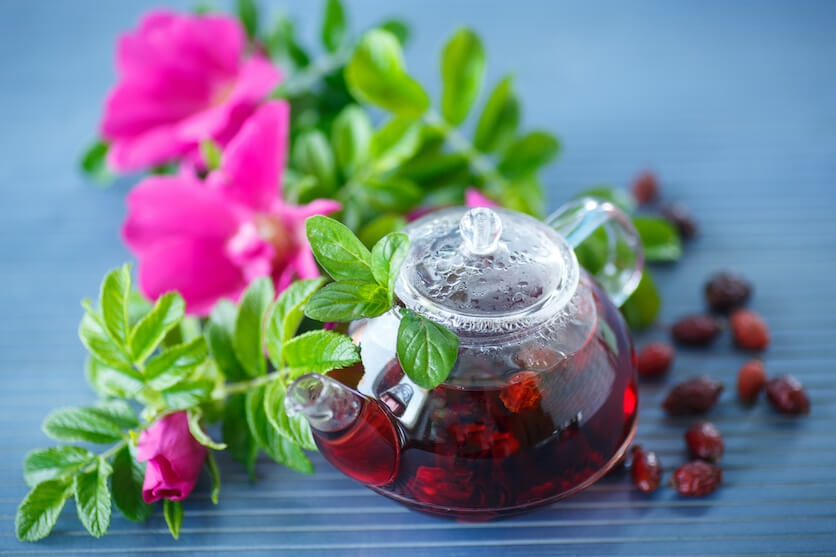
We are not medical experts and cannot advise whether or not this tea is safe to drink daily. What we can tell you is there is no evidence-based information stating rosehip tea is unsafe to consume. When combining rosehip with other herbs, keep in mind that some herbs interact with medications and may cause adverse reactions.
The National Library of Medicine recommends caution when drinking rosehip tea while on certain medications (see below) because of the Vitamin C in rosehip.
- Antacids
- Estrogen
- Lithium
- Anticoagulants and antiplatelets
- Aspirin
What Are The Side Effects Of Rosehips?
Although more research is warranted on rose hips and any side effects, the National Library of Medicine recommends pregnant, and nursing women and those with a history of kidney stones should use caution when consuming rosehip tea. Consult with your healthcare provider before drinking this tea to ensure it is safe for you to enjoy.
Rosehip Tea Benefits
Although there is little research on how rosehip tea benefits certain medical conditions, many individuals claim its efficacy for numerous ailments.
What Is Rosehip Tea Good For?
The International Journal of Molecular Sciences published the results of a study on the therapeutic benefits of rosehip. The study reports that rosehip is an antioxidant because of numerous compounds, vitamins (C, E, B,) and carotenoids. Rosehip proved to reduce cytokines that cause rheumatoid arthritis, osteoarthritis, and inflammatory bowel disease. Furthermore, rosehip was also said to have antibacterial, antiviral, and antifungal benefits.
Is Rosehip Tea Good For Anxiety?
Those with chronic pain are more prone to depression and anxiety. The Australian Family Medicine Journal published a study article that sheds light on how rosehip helps those with one of the most common inflammatory conditions (osteoarthritis.) Rosehip proved to be effective in improving osteoarthritic pain, which in turn reduces anxiety.
How To Make Rosehip Tea
If you have a Rosa canina (dog rose) growing in the garden, you have the perfect makings for a cup of rosehip tea. So, how do you make rosehip tea from your garden rose bush? You can harvest rose hips from your bush, but only if it is pesticide-free.
Rose hips are not ripe until the rose falls off and the hips turn a bright red. Simply pluck them off once ripe. Clean out the inside seeds and discard them. When brewing your tea, drop the outer flesh of the rosehip into the hot water during steeping.
Rosehip Tea Recipes
Whether you like iced or hot tea, we have a recipe for each below that you can enjoy.
Rosehip Iced Tea
This tea is lovely to drink in the summer. Pair it with freshly baked sugar cookies for a nice afternoon snack.
Ingredients
- 4 Hibiscus-Rosehip tea bags
- 4 cups of water
Directions
- Bring the water to a boil.
- Remove from the heat.
- Place the teabags into the water and cover.
- Allow to steep for about 5 minutes.
- Discard the teabags.
- Allow the tea to cool.
- Pour the tea glasses filled with ice and enjoy!
Unadulterated Rosehip Tea
We are going to walk you through how to take those freshly plucked rose hips and make an unadulterated rosehip tea.
Ingredients
- 4 freshly picked ripe rose hips (deseeded and thoroughly cleaned)
- 2 cups of water
- ⅛ teaspoon of honey (to sweeten as desired)
Directions
- Bring the water to a boil.
- Remove from the heat.
- Drop the rose hips into the hot water and cover.
- Allow to steep for about 10 minutes.
- Discard the rose hips.
- Pour the tea into a teacup and enjoy.
“Rosey” Goodness
If you are looking for a tisane (herbal tea) to try that’s not overwhelming, you may enjoy rosehip tea. The subtle sweetness and simplicity and claims of benefits are what attract many to drink this tea.
